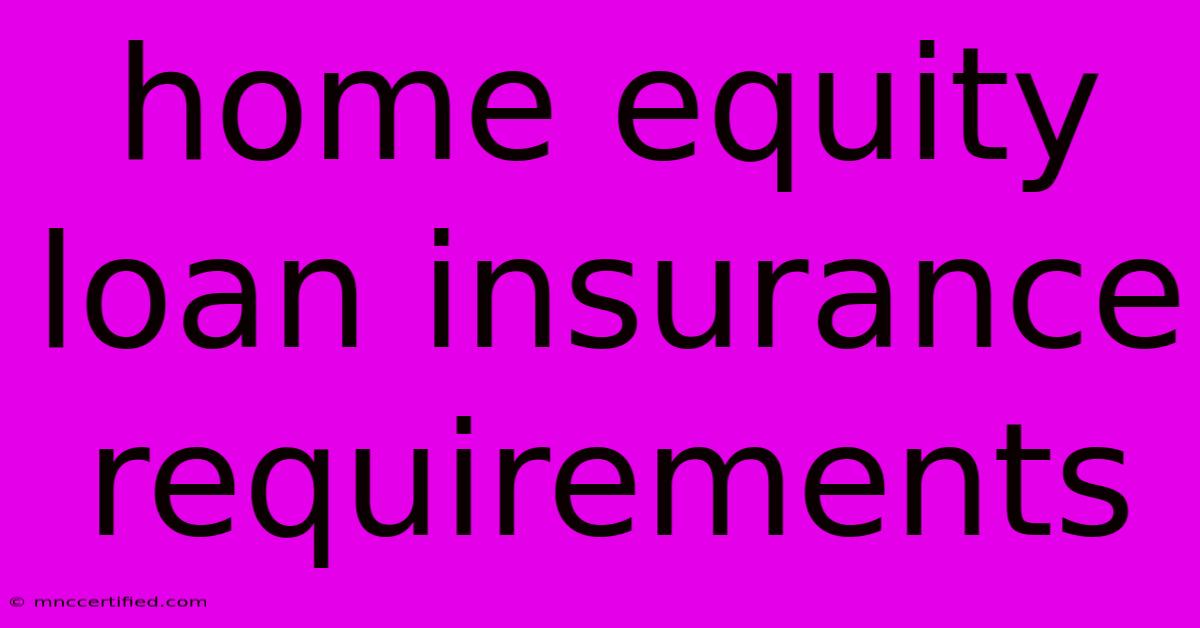Home Equity Loan Insurance Requirements

Table of Contents
Navigating the Labyrinth: Home Equity Loan Insurance Requirements
A home equity loan can be a valuable financial tool, providing access to funds for various needs, from home renovations to debt consolidation. However, the application process can be complex, especially when it comes to understanding insurance requirements. This article will guide you through the intricacies of home equity loan insurance, clarifying the different types and their importance.
The Basics: Why Insurance Matters
Insurance plays a crucial role in safeguarding both you and the lender in a home equity loan scenario. Here's why:
- Protecting the Lender: The lender's investment is secured by your home. In case of default, insurance helps ensure they can recover their investment.
- Protecting Yourself: Insurance can provide financial protection in the event of unexpected events like disability or death.
Types of Home Equity Loan Insurance
The specific insurance requirements for a home equity loan can vary depending on the lender and your individual circumstances. However, here are some common types:
1. Mortgage Life Insurance: This insurance policy pays off the remaining balance of your loan in the event of your death.
2. Mortgage Disability Insurance: If you become disabled and unable to make your loan payments, this insurance covers your monthly payments for a specified period.
3. Property Insurance: This is essential to protect your home from damage caused by events like fire, theft, or natural disasters. It's often a requirement for obtaining a home equity loan.
4. Flood Insurance: If your home is located in a high-risk flood zone, your lender may require flood insurance. This covers damage caused by flooding.
5. Private Mortgage Insurance (PMI): This type of insurance is typically required if you have a low down payment for your home equity loan. It protects the lender in case of default.
How to Determine Your Insurance Needs
To understand the insurance requirements for your home equity loan, consider these factors:
- Your Lender's Requirements: Your lender will have specific insurance policies they may require. Carefully review the loan terms and conditions.
- Your Financial Situation: Assess your risk tolerance and financial situation. For example, if you are self-employed, you may want to consider disability insurance.
- The Loan Amount: The amount you borrow will affect the premium cost of some insurance policies.
Pro Tip: Don't hesitate to ask your lender for clarification on any insurance requirements.
Choosing the Right Insurance
Once you understand the insurance options and your individual needs, you can make informed decisions.
Here are some factors to consider when selecting insurance:
- Coverage: Ensure the policy provides adequate coverage for your specific situation.
- Premium Costs: Compare premiums from different providers to find the most competitive rates.
- Reputation: Choose a reputable insurance company with a strong financial standing.
Understanding the Insurance Process
Once you've decided on your insurance options, be prepared for the following steps:
- Application: Complete an application form and provide any required documentation.
- Underwriting: The insurance company will review your application and determine your eligibility and premium cost.
- Policy Issuance: Once approved, you will receive a policy outlining the terms and conditions of your insurance.
Final Thoughts
Home equity loan insurance can be a valuable investment, providing peace of mind and financial protection for you and your lender. By understanding the different types of insurance, determining your specific needs, and choosing the right policy, you can navigate the insurance process with confidence. Remember, consulting with a financial advisor can provide valuable guidance in making informed decisions.

Thank you for visiting our website wich cover about Home Equity Loan Insurance Requirements. We hope the information provided has been useful to you. Feel free to contact us if you have any questions or need further assistance. See you next time and dont miss to bookmark.
Featured Posts
-
What Is A Modified Life Insurance Policy
Nov 08, 2024
-
Brianna Chickenfry Accuses Zach Bryan Of Abuse
Nov 08, 2024
-
Outer Banks Part 2 What You Need To Remember
Nov 08, 2024
-
Susie Wiles Trumps First Female White House Appointee
Nov 08, 2024
-
Bengals Vs Ravens Live Score Updates
Nov 08, 2024